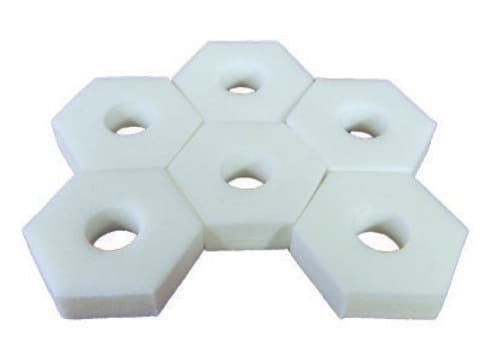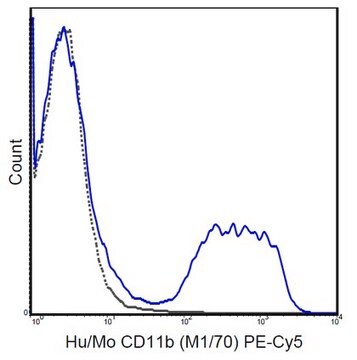EPI010
Sirtuin 2 (SIRT2) Inhibitor Screening Assay Kit
100 assays in 96 well plates
Iniciar sesiónpara Ver la Fijación de precios por contrato y de la organización
About This Item
UNSPSC Code:
12352200
NACRES:
NA.41
Productos recomendados
usage
100 assays in 96 well plates
storage condition
protect from light
NCBI accession no.
shipped in
wet ice
storage temp.
−20°C
Gene Information
human ... SIRT2(22933)
mouse ... SIRT2(64383)
General description
Sirtuin 2 (SIRT2) is a cytoplasmic protein and is part of the sirtuin family of proteins. Sirtuin family contains a sirtuin core domain and isgrouped into four classes with SIRT2 being a member of class I. SIRT2 colocalizes with microtubules. The gene encoding this protein is localized on human chromosome 19q13.2.
With Sigma′s Sirtuin Inhibitor Screening Kit, Sirtuin deacetylates the Substrate, and then a Developer cleaves the deacetylated substrate to release a fluorescent group, the latter of which can be detected at Ex/Em = 395/541 nm. In the presence of a SIRT inhibitor, the deacetylation will be impeded, preventing substrate cleavage and release of the fluorescent group. The kit provides a rapid, simple, sensitive, and reliable test, which is suitable for both low and high-throughput screening of SIRT2 inhibitors. A positive control inhibitor, Nicotinamide, is included to compare with the efficacy of the test inhibitors.
With Sigma′s Sirtuin Inhibitor Screening Kit, Sirtuin deacetylates the Substrate, and then a Developer cleaves the deacetylated substrate to release a fluorescent group, the latter of which can be detected at Ex/Em = 395/541 nm. In the presence of a SIRT inhibitor, the deacetylation will be impeded, preventing substrate cleavage and release of the fluorescent group. The kit provides a rapid, simple, sensitive, and reliable test, which is suitable for both low and high-throughput screening of SIRT2 inhibitors. A positive control inhibitor, Nicotinamide, is included to compare with the efficacy of the test inhibitors.
Application
Sirtuin 2 (SIRT2) inhibitor screening assay kit has been used for acetyl peptide deacetylase assay.
Biochem/physiol Actions
Sirtuin 2 (SIRT2) maintains the integrity of the genome. Inhibition of SIRT2 can lead to neuroprotection in cellular and invertebrate models of Huntington′s disease. Huntington′s disease is characterized by increased sterol synthesis in neuronal cells and this process is reversed by SIRT2 inhibition. SIRT2 can deacetylate lys40 of α-tubulin both in vitro and in vivo. Knockdown of SIRT2 by small interfering RNA (siRNA) leads to tubulin hyperacetylation.
Features and Benefits
- Simple, sensitive, and reliable assay
- Species reactivity: mammalian
- Utilizes fluorometric methods
- Suitable for individual tests or high throughput assays
- Convenient 96-well microplate format
- Screening and characterization of Sirtuin inhibitors
related product
Referencia del producto
Descripción
Precios
signalword
Warning
hcodes
Hazard Classifications
Eye Irrit. 2 - STOT SE 3
target_organs
Respiratory system
Storage Class
10 - Combustible liquids
Elija entre una de las versiones más recientes:
Certificados de análisis (COA)
Lot/Batch Number
Lo sentimos, en este momento no disponemos de COAs para este producto en línea.
Si necesita más asistencia, póngase en contacto con Atención al cliente
¿Ya tiene este producto?
Encuentre la documentación para los productos que ha comprado recientemente en la Biblioteca de documentos.
Proteomics-based identification of differentially expressed genes in human gliomas: down-regulation of SIRT2 gene
Masaharu Hiratsuka
Biochemical and Biophysical Research Communications (2003)
The human Sir2 ortholog, SIRT2, is an NAD+-dependent tubulin deacetylase.
North BJ
Molecular and Cellular Biochemistry, 11(2) (2003)
Damir Janigro
The Cell Cycle in the Central Nervous System (2008)
Propofol Inhibits SIRT2 Deacetylase through a Conformation-specific, Allosteric Site*
Brian P
The Journal of Biological Chemistry (2015)
SIRT2 inhibition achieves neuroprotection by decreasing sterol biosynthesis
Ruth Luthi-Carter
Proceedings of the National Academy of Sciences of the USA (2010)
Nuestro equipo de científicos tiene experiencia en todas las áreas de investigación: Ciencias de la vida, Ciencia de los materiales, Síntesis química, Cromatografía, Analítica y muchas otras.
Póngase en contacto con el Servicio técnico









